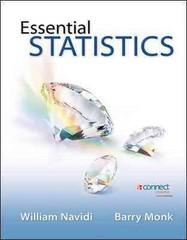Question
Question One (worth five points) Give an example of something you could do, and that you would be quite good at, but the opportunity cost
Question One (worth five points)
Give an example of something you could do, and that you would be quite good at, but the opportunity cost is too high. Give a brilliant example that will light up the room. Define opportunity cost.
Question Two (worth five points)
Give one example that illustrates how a manager of a company will make a better decision if the manager takes into account opportunity cost when deciding on how to use resources.
Question Three (worth five points)
We usually associate the cost of something going up as being bad days for the person facing the increase in cost. However, given how economists interpret the concept of costs, when costs go up it is good news for an individual.
Come up with a great example that illustrates this.
Question Four (worth ten points)
A cancer researcher is testifying in front of a Senate committee and the researcher makes the following assertion: "We should spend $20 billion on cancer researchwhen it comes to research that has the potential to save lives we shouldn't be worried about costs."Prepare the sort of a response an economist would make to this assertion. In your answer explain why an economist, concerned about saving lives, would want to focus on cost and what the economist understands by the concept of cost.
Question Five (worth four points)
If you work at a job, you trade your time for a wage. If you buy a car from a private seller you give up cash in exchange for a car. If you go on a trip you give up your time and money in exchange for the trip.
Using some (all) of the above examples (or different examples that you come up with), explain why the trade is mutually beneficial. What are the costs to you and the other person and what are the benefits to you and the other person. What is the basis for a mutually beneficial trade? (For example, for the second example, what must be true about the value the seller attaches to the car compared to the value you attach to the car?)
Question Six (worth nine points)
- Food at a food court in an airport is much more expensive than at at a food court in a mall. Why is there greater scarcity for the airport? Was this scarcity created by someone? Who has the power of scarcity?
- Here is a link to a restaurant in Maine that only accepts reservations by postcard: https://people.com/food/erin-frenchs-restaurant-the-lost-kitchen-is-accepting-postcards-for-reservations-all-the-details/
Why is there scarcity? What would be the problem with the restaurant owners opening up ten new locations throughout Maine? Why don't the owners simply charge $800 for their meals? What return are the owners capturing with their power of scarcity?
- Here is a link to a discussion of how to visit Katmai National Parkhttps://www.boundfornowhere.com/blog2/howtogetto-katmainp
What is the basis of the power of scarcity? Why doesn't the government, which owns the national park, exercise its power of scarcity to get an enormous return? Who is capturing returns from the power of scarcity? (And if you would rather talk about the Boundary Waters go for it.)
Bonus Question (worth four points) For the occupations you were looking at, can you attribute any of the relatively high wages to the power of scarcity?Explain your reasoning.
Question Seven (worth eight points)
Economists argue that we are in equilibrium when economic profits are equal to zero. Making up a numerical example and telling stories explain the reasoning by economists. In your answer do the following. Explain how zero economic profits doesn't mean that people aren't making any money; why economists believe that negative economic profits means that someone else is earning positive economic profits and therefore we will see people exit the occupation/market they are in; and why economists believe that positive economic profits means
Question Eight (worth six points)
Positive economic profits should result in people/firms trying to enter a market. If positive economic profits persist then we should see people being willing to use resources to try to enter the market and it should be that there are barriers to entry.
- Give an example of a market where there are positive economic profits and highlight the evidence that people are trying to enter this market.
- Some barriers to entry are naturalpeople possess skills that are rare, firms have access to a resource that cannot easily be duplicated, there are substantial economies of scale. Think of an occupation and then think of a service or product where there are natural barriers to entry. Be specific.(Just so this is clear. You will be coming up with two examples. One where there is an occupation that has natural barriers and one where some firm produces a product or service where there are natural barriers to entry.
- Using the occupations you have researched, identify some barriers to entry that are created by government or by regulatory boards. Do these barriers appear to be anything other than attempts to allow people in the occupation to earn positive economic profits? Explain.
Bonus Question (worth six points)
Assume government uses dollar fines or jail time as a punishment designed to deter certain types of behavior.Give examples (think of the concept of opportunity cost) where imposing the same fines for all people for some offense would end up treating people unequally and imposing the same fail time for all people convicted of some offense would end up treating people unequally.Be specific.
Step by Step Solution
There are 3 Steps involved in it
Step: 1

Get Instant Access to Expert-Tailored Solutions
See step-by-step solutions with expert insights and AI powered tools for academic success
Step: 2

Step: 3

Ace Your Homework with AI
Get the answers you need in no time with our AI-driven, step-by-step assistance
Get Started


